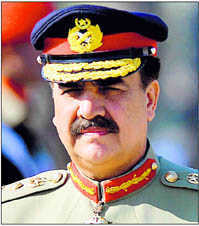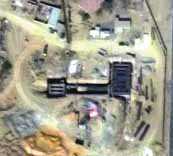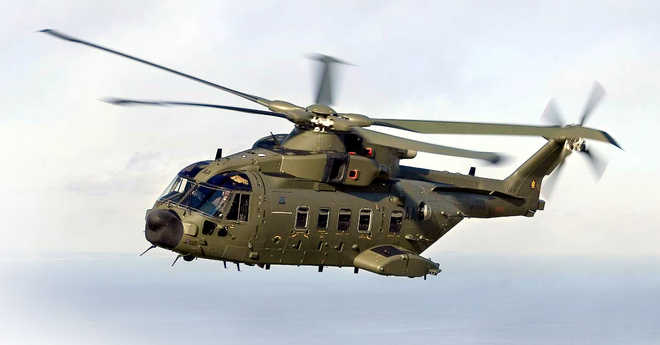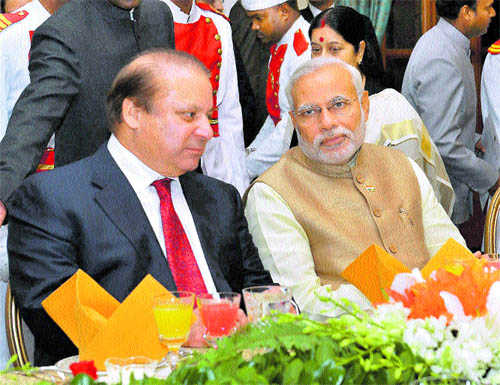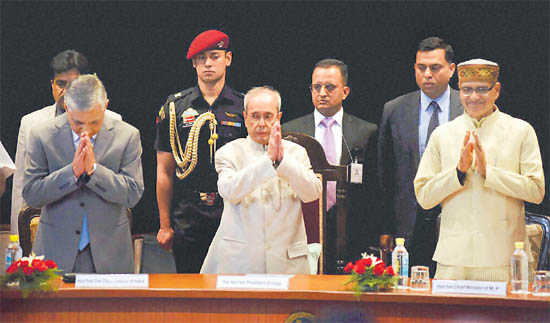Hasan Suroor
The “Doval doctrine” raises many worrying questions, especially when he pleads for an “integrated, synchronised” response to national security. It is a dangerous doctrine that has no place in a democracy with a long tradition of judicial fairplay.
President Pranab Mukherjee with Chief Justice of India TS Thakur (left) and Madhya Pradesh CM Shivraj Singh Chouhan (right) at the inauguration of 4th Retreat of Supreme Court Judges at the National Judicial Academy, Bhopal. PTI
Last week, Prime Minister Narendra Modi’s hyperactive National Security Adviser Ajit Doval gave what was innocuously described as a “briefing” to the Chief Justice of India TS Thakur and other Supreme Court judges on the “internal and external security situation”. A “briefing”? It sounded more like an indoctrination class for slightly dim pupils who had been upto mischief, and, worse, didn’t seem to care about the consequences of their actions. Had they ever contemplated that they were undoing all the hard work the government was valiantly trying to do to protect the nation from its enemies within and across the border? Officialese is good at sanitising language. Which is why the bureaucracy loves it. Thus, “briefing” has a nice neutral ring to it. But in plain English, at least the “briefing” under discussion translates into something slightly more sinister. It took place at a judges’ retreat at the National Judicial Academy in Bhopal last Friday. While such retreats have been held before this was said to be the first time that the learned judges had the privilege of being lectured to by the PM’s intelligence top dog himself. Details have not been officially disclosed, but even sketchy media accounts are enough to cause concern about New Delhi’s approach to judiciary under an overrated intelligence chief whose sole achievement has been to ratchet up security threat perceptions and float half-baked counter-terror theories. Let’s see what Doval told the gathering. According to The Indian Express whose Saturday’s Delhi edition led with the story, he sought the judges’ “cooperation” (or rather “more cooperation”) in securing the nation from its foes while cockily telling them to treat it as a “non-partisan issue”. Was he suggesting that the judiciary had been partisan? He then urged judges to realise the importance of an “integrated and synchronised” approach to national security. Which seemed another way of saying that they were not pulling their full weight in assisting the government’s (laudable) counter-terror efforts. Shorn of the gloss, it was a shamelessly blatant stab at influencing judiciary.Now, calling for “more cooperation” from judges in “speeding up” the judicial system is an unexceptional sentiment if it is an argument for clearing up judicial backlog. But if by “speeding up” Doval meant, as sceptics believe he did, that judges are guilty of holding up justice by allowing too many appeals by alleged terror suspects and interventions by human rights organisations then it is self-evidently problematic. For, in effect, he is questioning the very principle of natural justice and due processes of law in a democracy. It is a plea for courts to deny an accused their legitimate right to appeal against a verdict on valid legal grounds. Not to put too fine a point on it, it is a call for summary justice, the start of a slippery slope to kangaroo courts.This impatience with due processes — plus judicial activism and pressures from an increasingly assertive rights sector — is not unique to India. So-called “strong” governments around the world wish they had a magic wand to banish them so as to obtain instant judgements in their favour. The British government is forever railing against a generous judicial review regime that, it complains, is abused by too many people to avoid justice. But judges have held their ground arguing that an odd case of abuse cannot become the basis for throwing away the baby with the bathtub. No doubt, Indian judges too would stand up against any bullying. Still, the “Doval doctrine” raises many worrying questions especially when he pleads for an “integrated, synchronised” response to national security. Because, sans the jargon, what it really envisages is a judiciary stripped of any pretence of independence; and wants it to be on the same page as the government when dealing with terror cases or those involving offences by security agencies. This is a dangerous doctrine that has no place in a democracy with a long tradition of judicial fairplay. Meanwhile, the very idea that a bureaucrat, no matter how close to the boss, is able to give such a patronising pep talk to the country’s top judges should send alarm bells ringing for anyone who cares for judicial independence, especially at a time when most institutions are compromised. Doval’s lecture — sorry “briefing” — was as much an assault on the integrity of the courts as it was an insult to the judges who had to sit through it; and I’m sure their Lordships wouldn’t have been pleased. Doval’s move follows a pattern. His own ultra-hawkish reputation apart, it is a logical culmination of the Modi government’s cynical approach to institutional autonomy and dissent. After targeting universities, cultural institutions, human rights organisations and the bureaucracy it has now judiciary in its sights. However, this time it may not find it easy to get away with it. It risks provoking a public backlash if it tries to mess with judiciary. Because it is the only institution left that inspires public confidence and which people still trust. And they are not likely to tolerate any attempt to subvert it. Already, rights activists are hopping mad and have called for judges to give them a hearing also to get a more holistic sense of the issues raised by Doval. The Campaign for Judicial Accountability and Judicial Reforms (CJAR), a body of judges, lawyers and activists, has written to the Chief Justice urging him to invite prominent independent lawyers and representatives of credible rights groups to hear their side of the story arguing that it is important for them not to be swayed by one-sided briefing. The letter points out that “traditionally there has been a conflict between the perspectives offered by the security agencies and those that are offered by human rights organisations around the legitimacy of many actions of security agencies, some of which constitute a violation of human rights”. According to senior SC lawyer and CJAR convener, Prashant Bhushan, many such cases reach the courts for adjudication, and they are obliged to hear both sides. It is, therefore,“inappropriate” for judges to be briefed only by the NSA without giving rights groups a chance to offer an “alternative perspective” on how the actions of security agencies impact human rights. It is not without significance that Doval’s intervention coincides with a spurt in cases in which security agencies in several states, notably Jammu and Kashmir and Maoists’ “Red Belt”, are facing prosecution for alleged human rights violations. In the end, his sham “briefing” and rousing invocation of national security was simply a cover for bullying judiciary into going easy on his boys.The author is an Independent Commentator.
